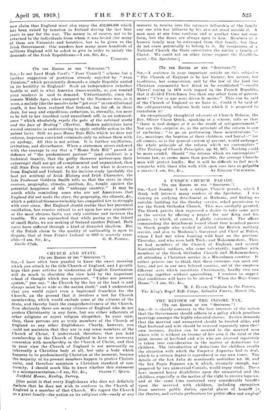ITo THE EOM' OF THE "SPECTLTOR."1 Stn,—A sentence in your
important article on this sulijecl- " The Church of England is by her history, her nature, her traditions, her composition, and by the law of the land the Christian community best fitted to be established "—recalls Thiers' eaying in 1870 with regard to the French Republic, that it divided Frenchmen less than any other form of govern- ment " C'est ce glue nous divine le moins." This can be said of the Church of England as we have it. Could it be said of the self-governing religions body into which it is proposed It transform it?
An exceptionally thoughtful advocate of Church Reform, the Rev. Oliver Chase Quick, speaking of a schism. tells us that "there is real danger of it as The result of self-government." Nor can this surprise us, as the principle of the reform is one of exclusion " to go on performing these ministrations "— Lc., marriage, the baptism of their children, and burial—" for all comers, as is the general custom at present, would endanger the whole principle of the reform which we contemplute " (The Teeing of Church Principles, pp. 81. 107). Nothing could he more candid. Should "the reform which we contemplate" become law, ns seems more than possible, the average Church- man will protest loudly. But it will be difficult to feel much sympathy with those who walk with open eyes into so palpable






































 Previous page
Previous page